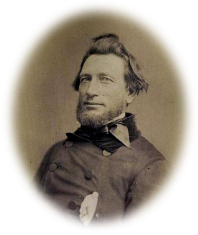November 1st.–At 12 o’clock, night, I reached camp, two miles north of Berlin, Maryland. Again I have left the pleasures of a cheerful, happy home, to encounter the hardships of camp life and to engage in the turmoil, the trials and the dangers of a war in which it is difficult to tell whether the hope of manufacturing political capital or of sustaining a government is the dominant motive.
American Civil War Chronicles
Downing’s Civil War Diary.–Alexander G. Downing.
October 31, 2022
Friday, 31st–This was general muster day, and we were reviewed this afternoon by the commanding officer, General McArthur. The general says our division is hard to beat, declaring that it would be difficult to find a better-looking number of men armed for active service than the Sixth Division. After the review we were mustered for pay. The weather is very warm and the roads are dusty.
Robert M. McGill
October 31, 2022
Friday, 31st.—Two men from each company furloughed for ten days. Harvey Montgomery came to see us to-day.
(Note: picture is of an unidentified Confederate soldier.)
War Diary of Luman Harris Tenney.
October 31, 2022
Friday, 31st. Reveille between two and three A. M. Breakfasted and off in advance at five on backward track. Reported that our rations had run short, a train been captured, etc.–again that we were to join Schofield, etc. Nothing of interest till we reached camp 10 miles from Bentonville, near where they were fired upon before. I had gone ahead to see if there was a spring up a ravine, advance a little ahead–halted–suddenly, “bang, bang, bang.” Drew revolver and waited. Nothing appeared. Saw Hoppy, Co. B, running by–followed. Heard him telling a woman to show him where to find the rebels. I told him we knew enough and two of us rushed up the hill and others followed. Burr, Co. G, rushed ahead. I saw nobody, soon heard shouting–Burr–saw him and followed. Got off half a mile. Foolishness to pursue so far with such a start. Followed a distance and was returning when we met Capt. Welch’s command. Scouted the woods some and went to camp. One man was overtaken, his arms taken and himself shot. Got dinner at the house. Considerable excitement.
Rebel War Clerk
October 31, 2022
OCTOBER 31st.—If it be not a Yankee electioneering trick to operate at the election in New York, on the fourth of November, the Northern correspondence with Europe looks very much like speedy intervention in our behalf.
Winder has really dismissed all his detectives excepting Cashmeyer, about the worst of them.
If we gain our independence by the valor of our people, or assisted by European intervention, I wonder whether President Davis will be regarded by the world as a second Washington? What will his own country say of him? I know not, of course; but I know what quite a number here say of him now. They say he is a small specimen of a statesman, and no military chieftain at all. And worse still, that he is a capricious tyrant, for lifting up Yankees and keeping down great Southern men. Wise, Floyd, etc. are kept in obscurity; while Pemberton, who commanded the Massachusetts troops, under Lincoln, in April, 1861, is made a lieutenant-general; G. W. Smith and Lovell, who were office-holders in New York, when the battle of Manassas was fought, are made major-generals, and the former put in command over Wise in Virginia, and all the generals in North Carolina. Ripley, another Northern general, was sent to South Carolina, and Winder, from Maryland, has been allowed to play the despot in Richmond and Petersburg. Washington was maligned.
October 25 to October 31, 1862
October 31, 2022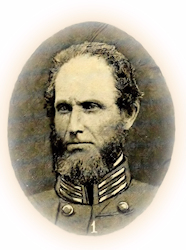
Oct. 25—Division moves and begins to tear up track of W and Harper’s Ferry R. R. Our Brigade operates on track below Charlestown during the night in a cold rain.
Sunday, Oct. 26—Cool rain. Sit till noon under tent in front of fire. Brigades of troops passing to and fro through rain. Men suffer. Very cool rain and wind all night. Large fire in front of tent all night.
Oct. 27—Brigade goes off to tear up railroad track. Revs. Power, Long and I go to Charlestown and ride on the spot of John Brown’s execution, and see the prison in which he was confined. Lovely little town.
Oct. 31, 1862—Cross Shenandoah river at Berry’s Ferry. Men wade. Cross mountain at Ashby’s Gap.
Wild Times in Mississippi
October 31, 2022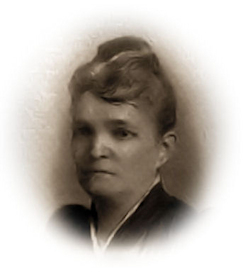
Oct. 31.—Mr. W. said last night the farmers felt uneasy about the “Emancipation Proclamation” to take effect in December. The slaves have found it out, though it had been carefully kept from them.
“Do yours know it?” I asked.
“Oh, yes. Finding it to be known elsewhere, I told it to mine with fair warning what to expect if they tried to run away. The hounds are not far off.”
The need of clothing for their armies is worrying them too. I never saw Mrs. W. so excited as on last evening. She said the provost-marshal at the next town had ordered the women to knit so many pairs of socks.
“Just let him try to enforce it and they’ll cow-hide him. He’ll get none from me. I’ll take care of my own friends without an order from him.”
“Well,” said Mr. W., “if the South is defeated and the slaves set free, the Southern people will all become atheists, for the Bible justifies slavery and says it shall be perpetual.”
“You mean, if the Lord does not agree with you, you’ll repudiate him.”
“Well, we’ll feel it’s no use to believe in anything.”
At night the large sitting-room makes a striking picture. Mr. W., spare, erect, gray-headed, patriarchal, sits in his big chair by the odorous fire of pine logs and knots roaring up the vast fireplace. His driver brings to him the report of the day’s picking and a basket of snowy cotton for the spinning. The hunter brings in the game. I sit on the other side to read. The great spinning wheels stand at the other end of the room, and Mrs. W. and her black satellites, the heads of the elderly women in bright bandanas, are hard at work. Slender and auburn-haired, she steps back and forth out of shadow into shine following the thread with graceful movements. Some card the cotton, some reel it into hanks. Over all the firelight glances, now touching the golden curls of little John toddling about, now the brown heads of the girls stooping over their books, now the shadowy figure of little Jule, the girl whose duty it is to supply the fire with rich pine to keep up the vivid light. If they would only let the child sit down! But that is not allowed, and she gets sleepy and stumbles and knocks her head against the wall and then straightens up again. When that happens often it drives me off. Sometimes while I read the bright room fades and a vision rises of figures clad in gray and blue lying pale and stiff on the blood-sprinkled ground.
Note: To protect Mrs. Miller’s job as a teacher in post-civil war New Orleans, her diary was published anonymously, edited by G. W. Cable, names were changed and initials were generally used instead of full names—and even the initials differed from the real person’s initials. (Read Dora Richards Miller’s biographical sketch.)
0
October 30, 2022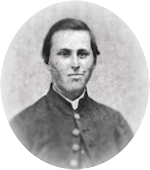
October 30th. Camp fires were kept burning very late last night. The boys are singing, dancing, making speeches, and having a very merry old time. All seem happy. This morning the regiment formed in line for our march out of the old fort. When outside of the walls cheering began as the happy boys went marching on.
The regiment made a fine appearance as they marched through Baltimore. Every man seemed to be trying to do his best. Stopping for a rest in one of the streets, a grocer treated us to apples. Citizens cheered us as we marched along. Passed through Baltimore on out to the east side, going into camp near Fort Marshall on Snake Hill. Camp being established it was named Emory in honor of the General. Seven companies sent out for guard duty along the Baltimore & Philadelphia Railroad. Bridges had been set on fire at times. There was much sympathy for the South in Maryland. Companies A, B, and C remained in camp. Regimental headquarters a pleasant location for a camp. Guard duty, drilling, dress parade, with an occasional tramp through the country on skirmish drill was about the daily routine of duty, weather permitting. One of the very pleasant things about camp life was the writing and receiving of letters.
Our duty at Camp Emory was not very laborious. Allowed to visit the city quite often on passes. After Sunday morning inspection no more duty required of us until dress parade. Guard duty must be done all the time.
Downing’s Civil War Diary.–Alexander G. Downing.
October 30, 2022
Thursday, 30th–The weather is quite warm again. We were at work getting ready for general inspection, cleaning camping ground, clothing and accouterments. Our camp is now in fine shape and the men are well rested. Some of the sick and wounded who have been absent for some weeks are returning to camp.
Robert M. McGill
October 30, 2022
Thursday, 30th.—Left camp at 6:30 A. M. Arrived at Lenoirs at 3 P. M. Reported that our regiment has been transferred to General Taylor’s Brigade.
(Note: picture is of an unidentified Confederate soldier.)
War Diary of Luman Harris Tenney.
October 30, 2022
Thursday, 30th. In the rear guard again. Till noon getting to Maysville, a little place, mostly forsaken, a few old people. Tried to catch a hog. Didn’t succeed. Letters from home, Sept. 30th, and an Independent. Read Lorain News. Little article about N. and me being taken prisoners.
Rebel War Clerk
October 30, 2022
OCTOBER 30th.—The Commissary-General is in hot water on account of some of his contracts, and a board of inquiry is to sit on him.
The President has delayed the appointment of Gen. E. Johnson, and Gen. Echols writes that several hundred of his men have deserted; that the enemy, 10,000 or 15,000 strong, is pressing him, and he must fall back, losing Charleston, Virginia, the salt works, and possibly the railroad. He has less than 4000 men!
But we have good news from England—if it be true. The New York Express says Lord Lyons is instructed by England, and perhaps on the part of France and other powers, to demand of the United States an armistice; and in the event of its not being acceded to, the governments will recognize our independence. One of the President’s personal attendants told me this news was regarded as authentic by our government. I don’t regard it so.
Yesterday the whole batch of “Plug Ugly” policemen, in the Provost Marshal’s “department,” were summarily dismissed by Gen. Winder, for “malfeasance, corruption, bribery, and incompetence.” These are the branches: the roots should be plucked up, and Gem Winder and his Provost Marshal ought to resign. I believe the President ordered the removal.
0
October 29, 2022
October 29th. Marching orders received. Our last day and night at Fort McHenry. Great rejoicing over the prospect of leaving the old place. Packing up and getting ready for an early start on the morrow. Singing and very happy in camp.
Downing’s Civil War Diary.–Alexander G. Downing.
October 29, 2022
Wednesday, 29th–The Eleventh Iowa was detailed to clean up and smooth a tract of ground for inspection. We are to have general inspection of the army here at Corinth, and it is to be made by General Grant.
Robert M. McGill
October 29, 2022
Wednesday, 29th.—Passed Copper Hill, 11 A. M. Some of our mess foraged to-day; had very good luck; bought bucket each of apple-butter and preserves. Preserves stolen from us that night, but caught the thief before he got to eat any of them.
(Note: picture is of an unidentified Confederate soldier.)
War Diary of Luman Harris Tenney.
October 29, 2022
Wednesday, 29th. Up at daybreak. In the rear guard. Waited several hours for the train to get by. Stewart and Jacobah came up and joked. Read a Leslie. Very slow work today, so many halts. Can not admire Capt. Seward. Had the impudence to keep me carrying water for him to drink. Lingered to guard a sutler, whose stock he tried–the miserable poison. Advance guard fired upon near a mill, three stories. Got into camp at Price’s old headquarters three miles from Maysville–an old Free Love Institute, they say. Had a little conversation with our guide of the 1st Arkansas. Bill and I went to work to get supper–soon others joined us.
Diary of David L. Day.
October 29, 2022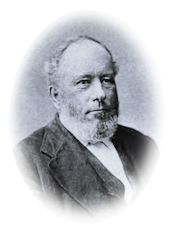
Col. Upton Leaves Us.
Oct. 29. Our regiment is now left with only one field officer, Major Pickett. Col. Upton left us yesterday and Lieut. Col. Sprague and Adjutant Harkness left us two weeks ago. Lieut. Col. Sprague left to take command of a nine months’ regiment already recruited in the city of Worcester. Adjutant Harkness is commissioned major of the same regiment. Col. Upton resigned on account of failing health, which I hope he may speedily recover after reaching home. All three of these officers have had the confidence and respect of the regiment in a marked degree, and our best wishes attend them in other fields. As a slight token of their regard for Col. Upton, the enlisted men are having manufactured a $1000 sword, which they intend to present to him. Major Pickett will succeed to the colonelcy, and according to military usage, Capt. Moulton of company II will be lieutenant colonel and Capt. Atwood of company C will be major. This will fill the field again, and occasion some changes and promotions in the line. I reckon if I was of an ambitious turn of mind, I should aspire to some of these places of honor and emolument, but remembering the promise that whoever humbleth himself shall be exalted, I will continue to wait on.
Reinforcements.
Massachusetts boys are getting thick as blueberries about here, and we are glad to see them. Three regiments of nine months’ troops have just arrived, the 3d, 5th and 44th regiments, and I hear that more are coming. A good many of the new comers have called on us and seem desirous of making our acquaintance, to which we are not averse, seeing they are good appearing fellows and have plenty of money, which is not a bad qualification, especially when introduced to the sutler. I learn that Gen. Foster leaves tomorrow on an expedition, taking with him nearly all the force here, including the three new regiments. That will be breaking them in pretty quick after getting here. They, of course, have not had much drill and probably half of them never fired a gun. But to us, a little trip up the country is cheering news. After being shut up in camp so long any change is gladly accepted.
Rebel War Clerk
October 29, 2022
OCTOBER 29th.—There was a rumor yesterday that the enemy were marching on Weldon; but we have no confirmation of it to-day.
Loring, after all, did not send his cavalry into Pennsylvania, I presume, since nothing has been heard of it.
The Charleston Mercury has some strictures on the President for not having Breckinridge in Kentucky, and Price in Missouri, this fall. They would doubtless have done good service to the cause. The President is much absorbed in the matter of appointments.
Gen. Wise was again ordered down the Peninsula last Saturday; and again ordered back when he got under way. They will not let him fight.
Downing’s Civil War Diary.–Alexander G. Downing.
October 28, 2022
Tuesday, 28th–The regiment worked on the fortifications today for the third day in succession. I was not with my company though, being on other fatigue duty. The forts under construction are arranged so that if one fort should be captured, the guns of two other forts could be turned upon the enemy in that one. The floors of the forts and the rifle-pits are raised from four to ten feet by filling in earth, and then laid with the lumber from the houses which were pulled down to make room for the fortifications. The ramparts are faced on the outside with long woven baskets of hickory withes and filled with earth to keep them in shape. The forts are built with a view of standing some time, and should last for four or five years. We commenced drawing bread instead of crackers.
Robert M. McGill
October 28, 2022
Tuesday, 28th.—Marching to-day over the Emory Road in the direction of Lenoir’s, Tenn. Plenty of apples along the road. One fellow of Company D fell out of an apple tree and came very near killing himself.
(Note: picture is of an unidentified Confederate soldier.)
War Diary of Luman Harris Tenney.
October 28, 2022
Tuesday, 28th. Reveille at three. Breakfasted and were on the move at 6 in the advance–bound for Maysville. Capt. kept me running a good deal. Passed through Bentonville about noon. Saw several whom I had seen on my other visit there. Passed along two miles. Got plenty of rambow apples at an orchard. Encamped in an orchard. Had to go two miles for water. An old man showed us protection papers, signed by Curtis, given because he went for the old Constitution.
Rebel War Clerk
October 28, 2022
OCTOBER 28th.—Gen. Bragg is here, but will not probably be deprived of his command. He was opposed by vastly superior numbers, and succeeded in getting away with the largest amount of provisions, clothing, etc., ever obtained by an army. He brought out 15,000 horses and mules, 8000 beeves, 50,000 barrels of pork, a great number of hogs, 1,000,000 yards of Kentucky cloth, etc. The army is now at Knoxville, Tennessee, in good condition. But before leaving Kentucky, Morgan made still another capture of Lexington, taking a whole cavalry regiment prisoners, destroying several wagon trains, etc. It is said Bragg’s train of wagons was forty miles long! A Western tale, I fear.
Letters from Lee urge the immediate completion of the railroad from Danville to Greenville, North Carolina, as of vital importance. He thinks the enemy will cut the road between this and Weldon. He wants Confederate notes made a legal tender; and the President says that, as the courts cannot enforce payment in anything else, they are substantially a legal tender already. And he suggests the withholding of pay from officers during their absence from their regiments. A good idea.
Everything indicates that Richmond will be assailed this fall, and that operations in the field are not to be suspended in the winter.
Polk, Bragg, Cheatham, etc. are urging the President to make Col. Preston Smith a brigadier-general. Unfortunately, Bragg’s letter mentioned the fact that Beauregard had given Smith command of a brigade at Shiloh; and this attracting the eye of the President, he made a sharp note of it with his pencil. “What authority had he for this?” he asked; and Col. Smith will not be appointed.
Wild Times in Mississippi
October 28, 2022
Oct. 28, 1862.—It is a month to-day since I came here. I only wish H. could share these benefits—the nourishing food, the pure aromatic air, the sound sleep away from the fevered life of Vicksburg. He sends me all the papers he can get hold of, and we both watch carefully the movements reported, lest an army should get between us. The days are full of useful work, and in the lovely afternoons I take long walks with a big dog for company. The girls do not care for walking. In the evening Mr. W. begs me to read aloud all the war news. He is fond of the “Memphis Appeal,” which has moved from town to town so much that they call it the “Moving Appeal.” I sit in a low chair by the fire, as we have no other light to read by. Sometimes traveling soldiers stop here, but that is rare.
Note: To protect Mrs. Miller’s job as a teacher in post-civil war New Orleans, her diary was published anonymously, edited by G. W. Cable, names were changed and initials were generally used instead of full names—and even the initials differed from the real person’s initials. (Read Dora Richards Miller’s biographical sketch.)
Downing’s Civil War Diary.–Alexander G. Downing.
October 27, 2022
Monday, 27th–Our entire regiment was at work on the fortifications. Nathan Chase and William Cross of my company had a fight today, all over some trivial matter. It seems that it is enough to have to fight the rebels without the men fighting among themselves. They were put into the guardhouse.
Robert M. McGill
October 27, 2022
Monday, 27th.—Drew my bounty to-day, $50.00. Clothing commutation, $25.00 and two months’ wages, $22.00; making $97.00.
(Note: picture is of an unidentified Confederate soldier.)
